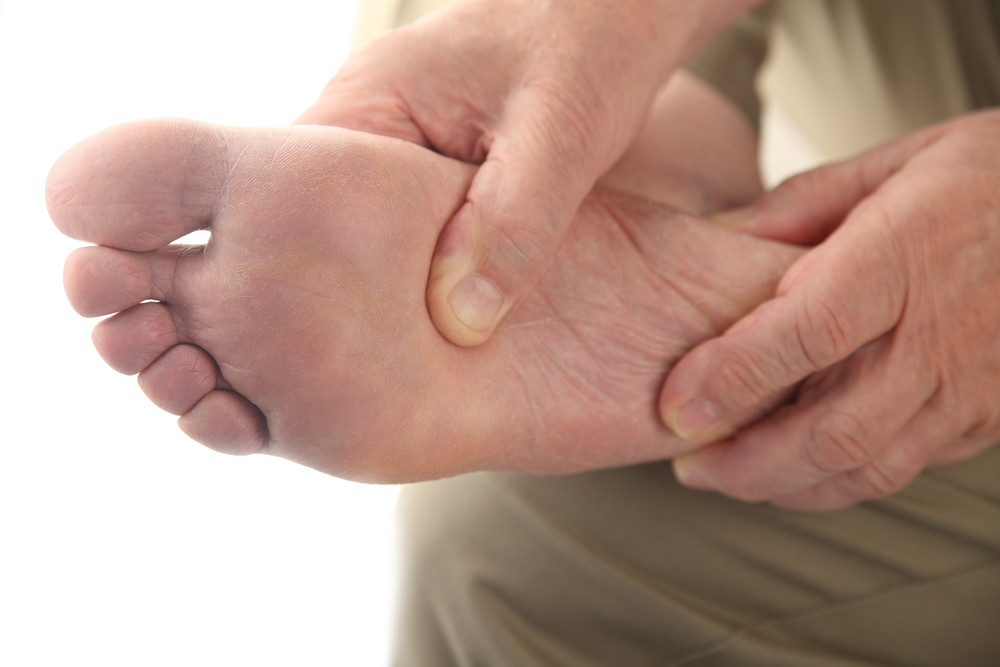Connect With Us
Blog
Keeping a Watchful Eye on the Diabetic’s Feet
Complications from diabetes can have profound effects on foot and ankle health. Heightened glucose levels can lead to nerve damage (neuropathy) and blockages in the blood vessels (peripheral vascular disease). Both of these obstacles can increase a diabetic’s risk for developing, detecting, and healing foot ulcers. Non-healing diabetic ulcers can become infected and lead to far more serious complications such as gangrene or even amputation in the most severe cases. These high-risk scenarios make it imperative for diabetics to check their feet daily for any cuts or abrasions and be under the care of a podiatrist who can help them manage any stumbling blocks that may arise.
Diabetic foot care is important in preventing foot ailments such as ulcers. If you are suffering from diabetes or have any other concerns about your feet, contact one of our podiatrists from The Podiatry Center, PC. Our doctors can provide the care you need to keep you pain-free and on your feet.
Diabetic Foot Care
Diabetes affects millions of people every year. The condition can damage blood vessels in many parts of the body, especially the feet. Because of this, taking care of your feet is essential if you have diabetes, and having a podiatrist help monitor your foot health is highly recommended.
The Importance of Caring for Your Feet
- Routinely inspect your feet for bruises or sores.
- Wear socks that fit your feet comfortably.
- Wear comfortable shoes that provide adequate support.
Patients with diabetes should have their doctor monitor their blood levels, as blood sugar levels play such a huge role in diabetic care. Monitoring these levels on a regular basis is highly advised.
It is always best to inform your healthcare professional of any concerns you may have regarding your feet, especially for diabetic patients. Early treatment and routine foot examinations are keys to maintaining proper health, especially because severe complications can arise if proper treatment is not applied.
If you have any questions please feel free to contact our office located in Millburn, NJ . We offer the newest diagnostic and treatment technologies for all your foot and ankle needs.
Risk Factors for Gout
Gout is a type of arthritis that is caused by excess uric acid in the bloodstream crystallizing and lodging in the joints. It frequently affects the joints of the big toes, which causes sudden and intense pain, swelling, redness, warmth, and stiffness. Certain people are more at risk of developing gout than others. People who have medical conditions such as diabetes, kidney disease, high blood pressure, high cholesterol, and osteoarthritis should be vigilant of any gout symptoms. Gout is also associated with obesity and with diets high in purines, which are found in seafood and red meat. Certain medications can increase uric acid levels in the body, which may lead to gout. Men are more likely to develop gout prior to the age of 60, while both men and women aged 60 and over have an equal risk of developing gout. Finally, gout may be more likely in people with a family history of this condition. If you have gout or are at risk for it, please consult with a podiatrist, who can help you get the right treatments and teach you strategies to prevent gout.
Gout is a foot condition that requires certain treatment and care. If you are seeking treatment, contact one of our podiatrists from The Podiatry Center, PC. Our doctors will treat your foot and ankle needs.
What Is Gout?
Gout is a type of arthritis caused by a buildup of uric acid in the bloodstream. It often develops in the foot, especially the big toe area, although it can manifest in other parts of the body as well. Gout can make walking and standing very painful and is especially common in diabetics and the obese.
People typically get gout because of a poor diet. Genetic predisposition is also a factor. The children of parents who have had gout frequently have a chance of developing it themselves.
Gout can easily be identified by redness and inflammation of the big toe and the surrounding areas of the foot. Other symptoms include extreme fatigue, joint pain, and running high fevers. Sometimes corticosteroid drugs can be prescribed to treat gout, but the best way to combat this disease is to get more exercise and eat a better diet.
If you have any questions please feel free to contact our office located in Millburn, NJ . We offer the newest diagnostic and treatment technologies for all your foot and ankle needs.
Plantar Warts Can Be Treated!
Help Your Child Step Into a Lifetime of Healthy Nails
Ingrown toenails can occur when toenails are too short and/or when footwear is too tight. Because children are still learning proper foot hygiene and their feet are growing so rapidly, they are quite susceptible to ingrown toenails. You can help them avoid this painful condition with a little guidance and supervision. Show them how to properly trim their toenails so that they can begin taking care of their own. After a shower or bath when their nails are softer, demonstrate how to properly trim toenails: straight across, and not rounded or too short. The corners of toenails should still be visible after trimming. Explain how these techniques allow nails to grow on top of the skin at the edges, rather than into it. Also, be sure to check frequently to make sure their shoes fit properly—both in length and width. Encourage them to get involved in their own foot health by being aware of when their shoes start feeling tight, and helping look for shoe styles with wider toe boxes when shoe shopping. If your child does develop an ingrown toenail, make an appointment with a podiatrist for proper treatment and to avoid an infection from possibly setting in.
Ingrown toenails may initially present themselves as a minor discomfort, but they may progress into an infection in the skin without proper treatment. For more information about ingrown toenails, contact one of our podiatrists of The Podiatry Center, PC. Our doctors can provide the care you need to keep you pain-free and on your feet.
Ingrown Toenails
Ingrown toenails are caused when the corner or side of a toenail grows into the soft flesh surrounding it. They often result in redness, swelling, pain, and in some cases, infection. This condition typically affects the big toe and may recur if it is not treated properly.
Causes
- Improper toenail trimming
- Genetics
- Improper shoe fitting
- Injury from pedicures or nail picking
- Abnormal gait
- Poor hygiene
You are more likely to develop an ingrown toenail if you are obese, have diabetes, arthritis, or have any fungal infection in your nails. Additionally, people who have foot or toe deformities are at a higher risk of developing an ingrown toenail.
Symptoms
Some symptoms of ingrown toenails are redness, swelling, and pain. In rare cases, there may be a yellowish drainage coming from the nail.
Treatment
Ignoring an ingrown toenail can have serious complications. Infections of the nail border can progress to a deeper soft-tissue infection, which can then turn into a bone infection. You should always speak with your podiatrist if you suspect you have an ingrown toenail, especially if you have diabetes or poor circulation.
If you have any questions, please feel free to contact our office located in Millburn, NJ . We offer the newest diagnostic and treatment technologies for all your foot care needs.
Read more about Ingrown Toenail CareCuboid Syndrome and Running
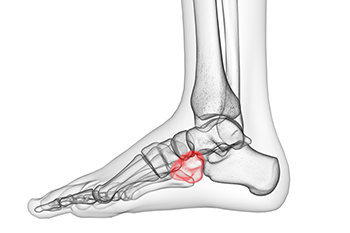 Cuboid syndrome is a condition in which the cuboid bone, located near the center of the foot, becomes displaced. If you’re a runner, this is a problem that you should watch out for. Your feet absorb shock up to two and a half times your body weight when you run. When all of the foot bones are properly aligned, your feet can absorb the shock without much discomfort. However, when the cuboid bone is displaced the feet can’t absorb shock as efficiently leading to foot pain, swelling, reduced range of motion, and difficulty bearing weight on the affected foot. Cuboid syndrome may occur in conjunction with an ankle sprain, or it can be caused by poor foot biomechanics or injury. If you are experiencing any foot pain please seek the care of a podiatrist.
Cuboid syndrome is a condition in which the cuboid bone, located near the center of the foot, becomes displaced. If you’re a runner, this is a problem that you should watch out for. Your feet absorb shock up to two and a half times your body weight when you run. When all of the foot bones are properly aligned, your feet can absorb the shock without much discomfort. However, when the cuboid bone is displaced the feet can’t absorb shock as efficiently leading to foot pain, swelling, reduced range of motion, and difficulty bearing weight on the affected foot. Cuboid syndrome may occur in conjunction with an ankle sprain, or it can be caused by poor foot biomechanics or injury. If you are experiencing any foot pain please seek the care of a podiatrist.
Cuboid syndrome, also known as cuboid subluxation, occurs when the joints and ligaments near the cuboid bone in the foot become torn. If you have cuboid syndrome, consult with one of our podiatrists from The Podiatry Center, PC. Our doctors will assess your condition and provide you with quality foot and ankle treatment.
Cuboid syndrome is a common cause of lateral foot pain, which is pain on the outside of the foot. The condition may happen suddenly due to an ankle sprain, or it may develop slowly overtime from repetitive tension through the bone and surrounding structures.
Causes
The most common causes of cuboid syndrome include:
- Injury – The most common cause of this ailment is an ankle sprain.
- Repetitive Strain – Tension placed through the peroneus longus muscle from repetitive activities such as jumping and running may cause excessive traction on the bone causing it to sublux.
- Altered Foot Biomechanics – Most people suffering from cuboid subluxation have flat feet.
Symptoms
A common symptom of cuboid syndrome is pain along the outside of the foot which can be felt in the ankle and toes. This pain may create walking difficulties and may cause those with the condition to walk with a limp.
Diagnosis
Diagnosis of cuboid syndrome is often difficult, and it is often misdiagnosed. X-rays, MRIs and CT scans often fail to properly show the cuboid subluxation. Although there isn’t a specific test used to diagnose cuboid syndrome, your podiatrist will usually check if pain is felt while pressing firmly on the cuboid bone of your foot.
Treatment
Just as the range of causes varies widely, so do treatments. Some more common treatments are ice therapy, rest, exercise, taping, and orthotics.
If you have any questions, please feel free to contact our office located in Millburn, NJ . We offer the newest diagnostic and treatment technologies for all your foot care needs.
Arthritis Can Cause Pain in the Feet and Ankles
How to Limit the Spread of Athlete’s Foot
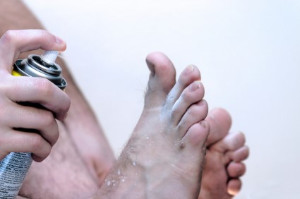 A common fungal infection that affects many people worldwide is athlete’s foot. It can cause the skin between the toes and on the bottom of the foot to become red, inflamed, and uncomfortable. Additional symptoms can include cracked and flakey skin, and in severe cases, blisters may develop. It is considered to be contagious, and lives in areas that may include public swimming pools, locker rooms, and surrounding areas. An effective prevention technique can consist of wearing appropriate shoes while in these types of environments. Research has indicated it is beneficial to refrain from sharing towels, socks, and shoes in order to help to limit the spread of athlete’s foot. It is helpful to wash clothes that have been worn, bath mats, and sheets, as this is instrumental in preventing the spread of athlete’s foot. If you believe you are afflicted with this condition, it is strongly suggested that you are under the care of a podiatrist who can help you properly manage your athlete’s foot.
A common fungal infection that affects many people worldwide is athlete’s foot. It can cause the skin between the toes and on the bottom of the foot to become red, inflamed, and uncomfortable. Additional symptoms can include cracked and flakey skin, and in severe cases, blisters may develop. It is considered to be contagious, and lives in areas that may include public swimming pools, locker rooms, and surrounding areas. An effective prevention technique can consist of wearing appropriate shoes while in these types of environments. Research has indicated it is beneficial to refrain from sharing towels, socks, and shoes in order to help to limit the spread of athlete’s foot. It is helpful to wash clothes that have been worn, bath mats, and sheets, as this is instrumental in preventing the spread of athlete’s foot. If you believe you are afflicted with this condition, it is strongly suggested that you are under the care of a podiatrist who can help you properly manage your athlete’s foot.
Athlete’s Foot
Athlete’s foot is often an uncomfortable condition to experience. Thankfully, podiatrists specialize in treating athlete’s foot and offer the best treatment options. If you have any questions about athlete’s foot, consult with one of our podiatrists from The Podiatry Center, PC. Our doctors will assess your condition and provide you with quality treatment.
What Is Athlete’s Foot?
Tinea pedis, more commonly known as athlete’s foot, is a non-serious and common fungal infection of the foot. Athlete’s foot is contagious and can be contracted by touching someone who has it or infected surfaces. The most common places contaminated by it are public showers, locker rooms, and swimming pools. Once contracted, it grows on feet that are left inside moist, dark, and warm shoes and socks.
Prevention
The most effective ways to prevent athlete’s foot include:
- Thoroughly washing and drying feet
- Avoid going barefoot in locker rooms and public showers
- Using shower shoes in public showers
- Wearing socks that allow the feet to breathe
- Changing socks and shoes frequently if you sweat a lot
Symptoms
Athlete’s foot initially occurs as a rash between the toes. However, if left undiagnosed, it can spread to the sides and bottom of the feet, toenails, and if touched by hand, the hands themselves. Symptoms include:
- Redness
- Burning
- Itching
- Scaly and peeling skin
Diagnosis and Treatment
Diagnosis is quick and easy. Skin samples will be taken and either viewed under a microscope or sent to a lab for testing. Sometimes, a podiatrist can diagnose it based on simply looking at it. Once confirmed, treatment options include oral and topical antifungal medications.
If you have any questions, please feel free to contact our office located in Millburn, NJ . We offer the newest diagnostic and treatment technologies for all your foot care needs.
How Did I Sprain My Ankle?
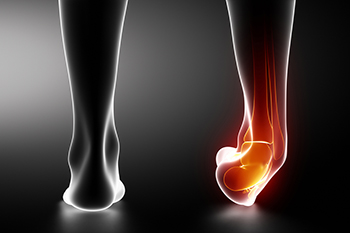 Sprained ankles are one of the most common injuries among athletes. Sprains occur when the ligaments that connect to the bones become inflamed or torn. Ankle sprains are usually noticeable right away, and they are often a result of the foot turning inwards under the body’s weight. Pain can also be felt throughout the ankle, and the joint will likely swell and become bruised. Common treatment methods for sprained ankles include ice, rest, an ankle brace, and ankle taping. However, it can be difficult to tell the difference between an ankle sprain and a fractured or broken ankle. Because of this, patients who believe that they have sprained their ankle should consult with a podiatrist for a proper diagnosis and advised treatment plan.
Sprained ankles are one of the most common injuries among athletes. Sprains occur when the ligaments that connect to the bones become inflamed or torn. Ankle sprains are usually noticeable right away, and they are often a result of the foot turning inwards under the body’s weight. Pain can also be felt throughout the ankle, and the joint will likely swell and become bruised. Common treatment methods for sprained ankles include ice, rest, an ankle brace, and ankle taping. However, it can be difficult to tell the difference between an ankle sprain and a fractured or broken ankle. Because of this, patients who believe that they have sprained their ankle should consult with a podiatrist for a proper diagnosis and advised treatment plan.
Ankle sprains are common but need immediate attention. If you need your feet checked, contact one of our podiatrists from The Podiatry Center, PC. Our doctors can provide the care you need to keep you pain-free and on your feet.
How Does an Ankle Sprain Occur?
Ankle sprains take place when the ligaments in your ankle are torn or stretched beyond their limits. There are multiple ways that the ankle can become injured, including twisting or rolling over onto your ankle, putting undue stress on it, or causing trauma to the ankle itself.
What Are the Symptoms?
- Mild to moderate bruising
- Limited mobility
- Swelling
- Discoloration of the skin (depending on severity)
Preventing a Sprain
- Wearing appropriate shoes for the occasion
- Stretching before exercises and sports
- Knowing your limits
Treatment of a Sprain
Treatment of a sprain depends on the severity. Many times, people are told to rest and remain off their feet completely, while others are given an air cast. If the sprain is very severe, surgery may be required.
If you have suffered an ankle sprain previously, you may want to consider additional support such as a brace and regular exercises to strengthen the ankle.
If you have any questions please feel free to contact our office located in Millburn, NJ . We offer the newest diagnostic and treatment technologies for all your foot and ankle needs.
Gout Pain Can Be Managed
Signs of a Broken Foot
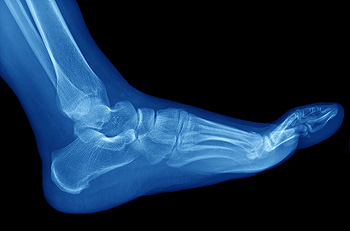 There are 26 bones in the foot and recognizing the symptoms of a broken bone is important for ensuring the overall health of your feet. A broken foot can be as simple as a small hairline fracture (such as a stress fracture), or it can be a severe break that tears or pierces the skin. The most common symptoms of a broken foot are pain, swelling, and bruising. Other common signs include a snapping or grinding sensation at the time of injury, difficulty or pain when moving the affected foot, inability to bear weight on the foot, tenderness from touching the injury, and difficulty walking. Telling the difference between a broken foot and a sprained foot can be difficult. That is why anyone who believes that they may have a broken foot should consult with a podiatrist for a proper diagnosis. A podiatrist will also be able to help provide the best treatment options for the broken bone.
There are 26 bones in the foot and recognizing the symptoms of a broken bone is important for ensuring the overall health of your feet. A broken foot can be as simple as a small hairline fracture (such as a stress fracture), or it can be a severe break that tears or pierces the skin. The most common symptoms of a broken foot are pain, swelling, and bruising. Other common signs include a snapping or grinding sensation at the time of injury, difficulty or pain when moving the affected foot, inability to bear weight on the foot, tenderness from touching the injury, and difficulty walking. Telling the difference between a broken foot and a sprained foot can be difficult. That is why anyone who believes that they may have a broken foot should consult with a podiatrist for a proper diagnosis. A podiatrist will also be able to help provide the best treatment options for the broken bone.
A broken foot requires immediate medical attention and treatment. If you need your feet checked, contact one of our podiatrists from The Podiatry Center, PC. Our doctors can provide the care you need to keep you pain-free and on your feet.
Broken Foot Causes, Symptoms, and Treatment
A broken foot is caused by one of the bones in the foot typically breaking when bended, crushed, or stretched beyond its natural capabilities. Usually the location of the fracture indicates how the break occurred, whether it was through an object, fall, or any other type of injury.
Common Symptoms of Broken Feet:
- Bruising
- Pain
- Redness
- Swelling
- Blue in color
- Numbness
- Cold
- Misshapen
- Cuts
- Deformities
Those that suspect they have a broken foot shoot seek urgent medical attention where a medical professional could diagnose the severity.
Treatment for broken bones varies depending on the cause, severity and location. Some will require the use of splints, casts or crutches while others could even involve surgery to repair the broken bones. Personal care includes the use of ice and keeping the foot stabilized and elevated.
If you have any questions please feel free to contact our office located in Millburn, NJ . We offer the newest diagnostic and treatment technologies for all your foot and ankle needs.
More...
Finding the Perfect Fit for Your Shoes
Shoe shopping can sometimes seem like an endless slog through shoes that are too roomy or too tight, when all you want is a pair that fits just right. Shoes that are too big might fail the “finger test” by allowing you to fit more than one finger between your heel and the end of the shoe, or might only stay on your foot when tightly laced. Shoes that are too small may squish your toes and rub uncomfortably against your heels. Occasionally, it may even be hard to determine the fit of a shoe when you try it on in the store. Some shoes, such as leather dress shoes, are made with materials that fit snugly at first but stretch over time. Shoes that fit perfectly will provide enough room in the toe area for you to wiggle your toes comfortably, fit snugly without chafing your heels or causing blisters, and support your foot and ankle. To learn more about how to find the right shoes for you, please consult with a podiatrist.
It is important to find shoes that fit you properly in order to avoid a variety of different foot problems. For more information about treatment, contact one of our podiatrists from The Podiatry Center, PC. Our doctors will treat your foot and ankle needs.
Proper Shoe Fitting
Shoes have many different functions. They cushion our body weight, protect our feet, and allow us to safely play sports. You should always make sure that the shoes you wear fit you properly in order to avoid injuries and deformities such as: bunions, corns, calluses, hammertoes, plantar fasciitis, stress fractures, and more. It is important to note that although a certain pair of shoes might be a great fit for someone else, that doesn’t mean they will be a great fit for you. This is why you should always try on shoes before buying them to make sure they are worth the investment. Typically, shoes need to be replaced ever six months to one year of regular use.
Tips for Proper Shoe Fitting
- Select a shoe that is shaped like your foot
- Don’t buy shoes that fit too tight, expecting them to stretch to fit
- Make sure there is enough space (3/8” to ½”) for your longest toe at the end of each shoe when you are standing up
- Walk in the shoes to make sure they fit and feel right
- Don’t select shoes by the size marked inside the shoe, but by how the shoe fits your foot
The shoes you buy should always feel as good as they look. Shoes that fit properly will last longer, feel better, and improve your way of life each day.
If you have any questions, please feel free to contact our office located in Millburn, NJ . We offer the newest diagnostic and treatment technologies for all your foot care needs.
Are Bunions Affecting Your Everyday Life?
Issues That May Cause Heel Pain
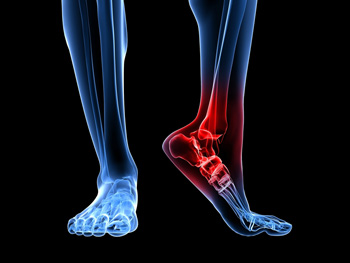 The heel bone is the largest bone in the foot, and it absorbs most of the impact when walking or running. Because of this, heel pain can cause a variety of problems that impact daily life. Plantar fasciitis is the leading cause of heel pain, and this is a result of the band of tissue that runs along the bottom of the foot (known as the plantar fascia) becoming inflamed or torn. Another source of heel pain is known as Achilles tendonitis. This occurs when the Achilles tendon, which connects the heel bone to the calf muscle, becomes inflamed or begins to degenerate. Bone spurs can also lead to heel pain. These are formed when calcium builds up on the bone, and they generally occur at the back of the heel. Other common sources of heel pain can include heel bone fractures, bursitis, tarsal tunnel syndrome, and Sever’s disease. If you are struggling with heel pain, consulting with a podiatrist is important in order to get a proper diagnosis and treatment for your condition.
The heel bone is the largest bone in the foot, and it absorbs most of the impact when walking or running. Because of this, heel pain can cause a variety of problems that impact daily life. Plantar fasciitis is the leading cause of heel pain, and this is a result of the band of tissue that runs along the bottom of the foot (known as the plantar fascia) becoming inflamed or torn. Another source of heel pain is known as Achilles tendonitis. This occurs when the Achilles tendon, which connects the heel bone to the calf muscle, becomes inflamed or begins to degenerate. Bone spurs can also lead to heel pain. These are formed when calcium builds up on the bone, and they generally occur at the back of the heel. Other common sources of heel pain can include heel bone fractures, bursitis, tarsal tunnel syndrome, and Sever’s disease. If you are struggling with heel pain, consulting with a podiatrist is important in order to get a proper diagnosis and treatment for your condition.
Many people suffer from bouts of heel pain. For more information, contact one of our podiatrists of The Podiatry Center, PC. Our doctors can provide the care you need to keep you pain-free and on your feet.
Causes of Heel Pain
Heel pain is often associated with plantar fasciitis. The plantar fascia is a band of tissues that extends along the bottom of the foot. A rip or tear in this ligament can cause inflammation of the tissue.
Achilles tendonitis is another cause of heel pain. Inflammation of the Achilles tendon will cause pain from fractures and muscle tearing. Lack of flexibility is also another symptom.
Heel spurs are another cause of pain. When the tissues of the plantar fascia undergo a great deal of stress, it can lead to ligament separation from the heel bone, causing heel spurs.
Why Might Heel Pain Occur?
- Wearing ill-fitting shoes
- Wearing non-supportive shoes
- Weight change
- Excessive running
Treatments
Heel pain should be treated as soon as possible for immediate results. Keeping your feet in a stress-free environment will help. If you suffer from Achilles tendonitis or plantar fasciitis, applying ice will reduce the swelling. Stretching before an exercise like running will help the muscles. Using all these tips will help make heel pain a condition of the past.
If you have any questions please contact our office located in Millburn, NJ . We offer the newest diagnostic and treatment technologies for all your foot and ankle needs.
How Older Adults Can Reduce Their Risk of Falling
As an older adult you may be more prone to falling, yet there are proactive measures to implement which can reduce your risk. Stay active with everyday activities and gentle exercise such as Tai Chi to keep muscles strong and improve balance. Clear your home of tripping hazards like clutter and loose throw rugs. Install proper lighting throughout your home, handrails on all stairs, and grab bars inside and outside the shower as well as next to the commode. Make sure any medications you take are not making you dizzy or sluggish. Have your eyes checked every year, and schedule regular appointments with a podiatrist who can help keep your feet healthy, suggest proper footwear, and even create custom orthotics to improve stability and support.
Preventing falls among the elderly is very important. If you are older and have fallen or fear that you are prone to falling, consult with one of our podiatrists from The Podiatry Center, PC. Our doctors will assess your condition and provide you with quality advice and care.
Every 11 seconds, an elderly American is being treated in an emergency room for a fall related injury. Falls are the leading cause of head and hip injuries for those 65 and older. Due to decreases in strength, balance, senses, and lack of awareness, elderly persons are very susceptible to falling. Thankfully, there are a number of things older persons can do to prevent falls.
How to Prevent Falls
Some effective methods that older persons can do to prevent falls include:
- Enrolling in strength and balance exercise program to increase balance and strength
- Periodically having your sight and hearing checked
- Discuss any medications you have with a doctor to see if it increases the risk of falling
- Clearing the house of falling hazards and installing devices like grab bars and railings
- Utilizing a walker or cane
- Wearing shoes that provide good support and cushioning
- Talking to family members about falling and increasing awareness
Falling can be a traumatic and embarrassing experience for elderly persons; this can make them less willing to leave the house, and less willing to talk to someone about their fears of falling. Doing such things, however, will increase the likelihood of tripping or losing one’s balance. Knowing the causes of falling and how to prevent them is the best way to mitigate the risk of serious injury.
If you have any questions, please feel free to contact our office located in Millburn, NJ . We offer the newest diagnostic and treatment technologies for all your foot care needs.
Blog Archives
- June 2025
- May 2025
- April 2025
- March 2025
- February 2025
- January 2025
- December 2024
- November 2024
- October 2024
- September 2024
- August 2024
- July 2024
- June 2024
- May 2024
- April 2024
- March 2024
- February 2024
- January 2024
- December 2023
- November 2023
- October 2023
- September 2023
- August 2023
- July 2023
- June 2023
- May 2023
- April 2023
- March 2023
- February 2023
- January 2023
- December 2022
- November 2022
- October 2022
- September 2022
- August 2022
- July 2022
- June 2022
- May 2022
- April 2022
- March 2022
- February 2022
- January 2022
- December 2021
- November 2021
- October 2021
- September 2021
- August 2021
- July 2021
- June 2021
- May 2021
- April 2021
- March 2021
- February 2021
- January 2021
- December 2020
- November 2020
- October 2020
- September 2020
- August 2020
- July 2020
- June 2020
- May 2020
- April 2020
- March 2020
- February 2020
- January 2020
- December 2019
- November 2019
- October 2019
- September 2019
- August 2019
- July 2019
- June 2019
- May 2019
- April 2019
- March 2019
- February 2019
- January 2019
- December 2018
- November 2018
- October 2018
- September 2018
- August 2018
- July 2018
- June 2018
- May 2018
- April 2018
- March 2018
- February 2018
- January 2018
- December 2017
- November 2017
- October 2017
- September 2017
- August 2017
- July 2017
- June 2017
- May 2017
- April 2017
- March 2017
- February 2017
- January 2017
- December 2016
- November 2016
- October 2016
- September 2016
- August 2016
- July 2016
- June 2016
- May 2016
- April 2016
- March 2016
- February 2016
- January 2016
- December 2015
- November 2015
- October 2015
- September 2015
- August 2015
- July 2015
- June 2015
- May 2015
- January 2014
- December 2013
- November 2013
- October 2013
- September 2013
- August 2013
- July 2013
- June 2013
- May 2013
- April 2013
- March 2013
- February 2013
- January 2013
- December 2012
- November 2012
- October 2012
- September 2012
- August 2012
- July 2012
- June 2012
